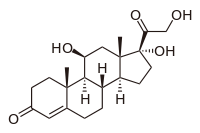
Photo from wikipedia
BACKGROUND AND AIMS Maternal hypercholesterolemia has been implicated in earlier onset of atherosclerotic lesions in neonatal offspring. In this study, we investigated whether maternal exposure to soy protein isolate (SPI)… Click to show full abstract
BACKGROUND AND AIMS Maternal hypercholesterolemia has been implicated in earlier onset of atherosclerotic lesions in neonatal offspring. In this study, we investigated whether maternal exposure to soy protein isolate (SPI) diet attenuated the progression of atherosclerosis in F1 offspring. METHOD Pregnant apolipoprotein E knockout (Apoe-/-) female mice were fed SPI diet until postnatal day 21 (PND21) of the offspring (SPI-offspring). SPI-offspring were switched at PND21 to casein (CAS) diet until PND140. Mice fed CAS throughout their lifetime (gestation to adulthood) were used as controls (CAS-offspring). RESULTS Atherosclerotic lesions in the aortic sinuses were reduced in SPI-offspring compared with CAS-offspring. Total serum cholesterol levels in CAS-offspring or dams were comparable to levels in their SPI-counterparts, suggesting that alternative mechanisms contributed to the athero-protective effect of maternal SPI diet. Aortic VCAM-1, MCP-1, and TNF-α mRNA and protein expression, and expression of macrophage pro-inflammatory cytokines was reduced in SPI-offspring. Interestingly, CD4+ T cells from SPI-offspring showed reduced IFN-γ expression (Th1), while the expression of IL-10 (Th2/Treg), and IL-13 (Th2) was increased. DNA methylation analyses revealed that anti-inflammatory T cell-associated Gata3 and Il13 promoter regions were hypomethylated in SPI-offspring. These findings suggest that anti-inflammatory macrophage and T cell response may have contributed to the athero-protective effect in SPI-offspring. CONCLUSIONS Our findings demonstrate that gestational and lactational soy diet exposure inhibits susceptibility to atherosclerotic lesion formation by promoting anti-inflammatory responses by macrophages and T cells.
Journal Title: Atherosclerosis
Year Published: 2020
Link to full text (if available)
Share on Social Media: Sign Up to like & get
recommendations!